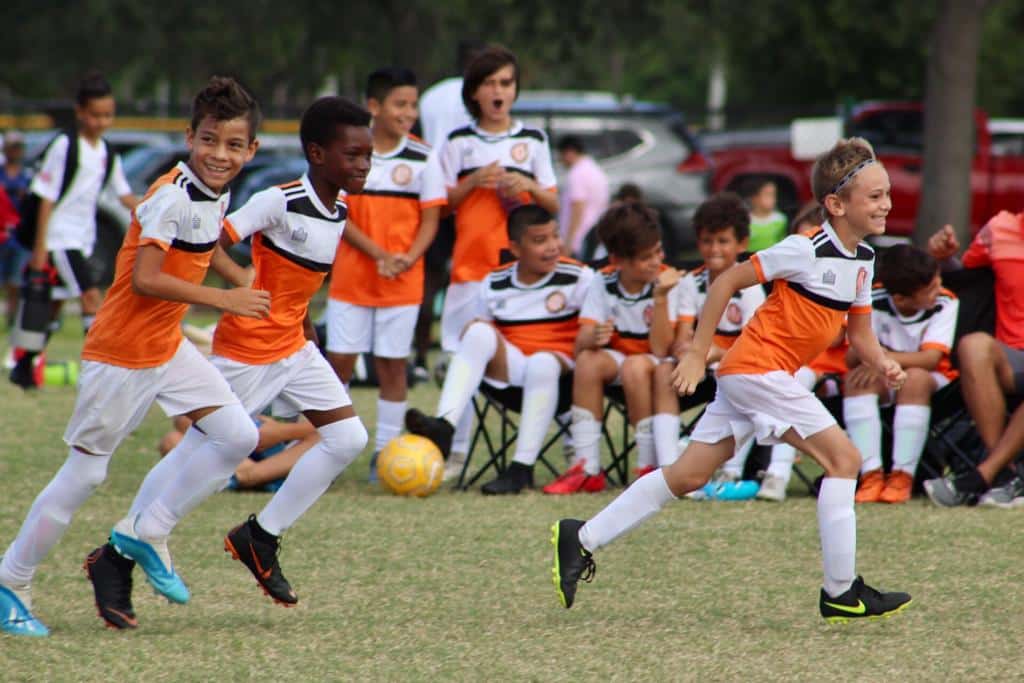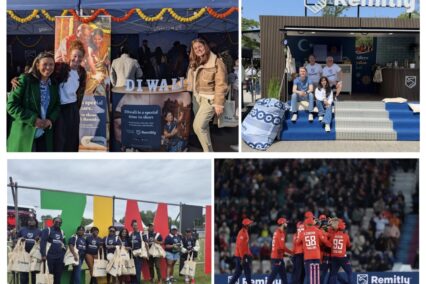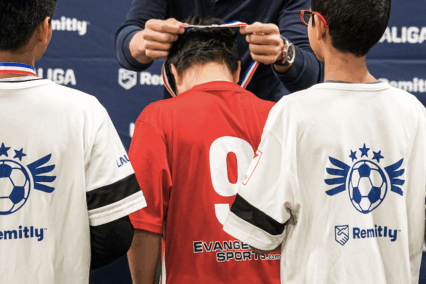Sports, particularly soccer, offer a meaningful way for many immigrants to build community while staying connected to their heritage. As a leading digital financial services provider for immigrants and their families, Remitly is committed to transforming lives that transcend borders, and we further this impact through initiatives that engage global communities in meaningful ways. Last year, Remitly and its employees supported over 200 global nonprofits through giving and volunteering, many of which focused on supporting immigrants and their families.
In addition, over the last several years, Remitly has supported non-profit organizations serving immigrants in North America via partnerships, community events, and other programs. In line with this commitment, in 2023 Remitly collaborated with TeamSnap, an app utilized by sports organizations to stay connected with players and their families, to sponsor local sports leagues in Miami along with their annual Coach of the Year award. This player-nominated award honors exceptional youth soccer coaches who have transformed the lives of their teams. Winning teams receive funding which can be used to support team costs including equipment, uniforms, or grants to cover team registration fees for families in need.
TeamSnap’s 2023 Coach of the Year award honored Gabor Pasztor, owner of Athletic Club Miami in South Florida. As a decorated international athlete and a Hungarian immigrant, Gabor shared how his belief in the transformative power of sports led him to open Athletic Club Miami and inspired a passion for positively impacting the lives of young players.
A decorated past
For Gabor, a passion for sports runs deep—both of his parents were Olympic gymnasts in Hungary and, as a child, he quickly followed in their footsteps until age 11. Gabor was seen playing soccer by a coach near a local school and was invited to a soccer league where he excelled; six years later, he was offered a contract to play professionally with a Division Three soccer club.
“I was only 18 and I found myself at a crossroads. My college did not allow me to play at my pro club for money, so if I wanted to continue my education I had to leave my adult club and join the college soccer team,” he recalls. “During my first year in college, the track coaches invited me to some running events to help the school; it went so well that I moved into the track program with the promise that if everything went well one day, I could make it to the national team.” At the time, Gabor was attending school, competing in track, and coaching twice a week. “I wanted to achieve academically and continue to compete on a high level,” Gabor says.

While in college, Gabor received the offer of his dreams: a place on the National Track Team. He traveled to Istanbul, Turkey to represent Hungary at his first European Cup event in 2008. Gabor rediscovered his love of soccer when he immigrated to Miami in 2012, working as a coach for an afterschool youth soccer team. With close to 60% of Miami’s population being born in a different country and soccer being one of the most popular sports in the world, Gabor saw an opportunity to make his mark by creating his own club, especially as a seasoned coach and athlete. “I had seen how the best soccer coaches work, and what systems work best,” he says. “I saw what could be better and what the parents were looking for, and I followed my instincts.”
Building the American Dream
After two months of working at the afterschool program as a coach, Gabor set plans to establish his own club in motion. “As an employee, I was able to gain some insights into how the business works without any risk,” he says. Without any upfront investment or marketing budget, Gabor personally distributed thousands of flyers in his neighborhood. “At the time, I lived in a 52-floor skyscraper and went to every floor via the stairs because I didn’t want to wait for the elevator,” he recalls. “I went to a neighboring building next door with 44 floors and did the same thing. I squatted down and slid flyers to every apartment on my own.”

His dedication paid off, and soon, he had seven children on his first team. However, he didn’t stop there—Gabor also created a non-profit arm of his company, awarding scholarships to families who can’t afford the full membership cost. “Many of my players and their families are from Latin America, and a lot of them just started their life here,” he says.
A bridge between two worlds
For many immigrants, soccer offers a sense of community and connection when far from home. Gabor’s team has both first and second-generation immigrants, who each face their own set of challenges. “Many of my players were born here and understand American culture more than their parents, but a lot of them moved to America at a young age,” he says. “They still have language barriers like I had, and some cultural surprises that come up.” For the teammates, being a part of Athletic Club Miami offers a sense of belonging, especially in a new environment. “The camaraderie the players build is an important thing,” he says. “My players are meeting with other soccer players within our club on birthdays and holidays. Their friendships become stronger because of these shared experiences on and off the field.”
The feeling of community extends beyond the players and to their families, too. Gabor recalls a time when some parents pooled money for a few of his players who couldn’t afford a team trip to Europe. “These parents knew some of the players couldn’t afford the trip, but donated money because they knew the kids worked really hard for over two years,” he says. “The sacrifices these parents make for the team are amazing. Everyone is always looking out and helping each other.”
Gabor, who describes his coaching style as a “tough love” approach rooted in discipline and rigor, sets high expectations for his students. “To excel in a sport at a high level, you need to work a lot and change your lifestyle. I see my kids want to get better, and it’s great to see how these changes affect other areas of their lives,” he says. “They start to think about eating better, they’re going to sleep earlier, and they start to read more to learn about soccer or their other interests. They learn how to become better physically and mentally.”

Gabor embodies his approach in the Club’s motto: “More than a practice, it’s a lifestyle! More than a game, it is your self-expression!” Soccer’s inclusive nature also makes it a confidence booster for children of various ages and abilities. “With other sports, you have to be really fast or strong to be a part of it, but soccer is different,” he says. “You can be short or tall, fast or slow, experienced or inexperienced. It’s a year-round sport, so any kid can continue to develop the skills to be a great soccer player.”
For Gabor, seeing his players develop their character on and off the field is as important as winning. “It’s about improvement and building up great character traits in the long term, even if most of the players won’t play at the college level,” he says.
The best reward
Gabor views winning TeamSnap’s Coach of the Year award and receiving recognition from his players and their families as one of the many high points in his coaching career. “When you get great feedback you feel like you’re on a good path, and that the decisions you’ve made in your career were the right ones,” he says. “To see the children you work with improve every day is very rewarding.”





